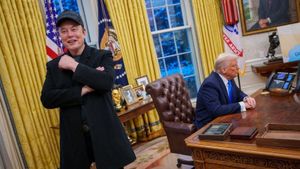Pakistan’s Prime Minister Shehbaz Sharif recently made headlines with his bold declaration during a public rally, asserting his government's determination to surpass India in terms of economic development. Speaking energetically to the crowd gathered on February 22, 2025, in Dera Ghazi Khan, Punjab, Sharif confidently stated, "If we don’t surpass India, my name isn’t Shehbaz Sharif." His emphatic remarks came as part of his vision for making Pakistan not just self-sufficient, but also strong enough to compete with its regional neighbor.
Sharif's speech was marked by high energy and dramatic gestures, as he passionately expressed the belief he and his government held about the nation's potential. He proclaimed, "We will make Pakistan a great nation and move ahead of India," reflecting both his ambition and the increasingly competitive rhetoric surrounding the countries' respective developments.
While the Prime Minister's enthusiasm was palpable, he also made significant claims about the economic situation under his leadership. Notably, he asserted, "The Almighty has always blessed Pakistan," and went on to claim inflation had dramatically decreased from 40% to just 2%. His remarks, though ambitious, lacked official data to support such statistics, leading to skepticism among commentators and the general public.
Sharif’s bold promises quickly spread across social media platforms, triggering diverse reactions ranging from humor to incredulity. Many social media users mocked his declarations, questioning their feasibility. One user humorously asked, "So, what will be his new name?" implying disbelief at his ambitious statements, as others echoed concerns about the disconnect between political promises and the prevailing economic realities.
One common sentiment among the skeptical voices was the juxtaposition of Sharif's latest declarations against his earlier statements advocating for peaceful dialogue with India. Only weeks prior, he expressed hopes for productive discussions on contentious issues like Kashmir, urging India to move past decisions from August 5, 2019, and engage constructively with Pakistan. His sudden shift to competitive rhetoric raised questions about his strategy and priorities as he faced mounting economic challenges.
Sharif's animated delivery at the rally showcased not just his political enthusiasm but also the pressures his administration is under. The Prime Minister, who made headlines for his passionate speeches, is often addressing crowds feeling the impact of Pakistan’s economic struggles. His government is grappling with substantial national debt, significantly owed to the International Monetary Fund (IMF), China, and various Arab nations.
Another noteworthy moment during the rally was when Sharif swore on the life of his elder brother, Nawaz Sharif, the former Prime Minister, stating, "I am Nawaz Sharif's fan, his follower. Today, I swear on his blessed life... we will all work together to take Pakistan to greatness and defeat India." This declaration not only highlighted his personal dedication to his goals but reinforced his family's longstanding involvement in Pakistan's political narrative.
Despite the fervor of his promises, many onlookers pointed out the potential pitfalls of making grandiose pledges without substantive investment or progress on existing economic issues. Critics labeled his declarations as "tall promises," highlighting the significant gap between verbal commitments and actual improvements seen by the populace.
Reactions from opponents and observers reveal concern about whether such rhetoric reflects genuine policies or simply serves to rally support amid political pressures. The skeptical commentary offers insight not just about Sharif’s statements, but also the broader economic challenges facing Pakistan as it tries to regain stability and growth.
While Shehbaz Sharif's ambitious vow to surpass India has captured public attention, it also invites scrutiny over his government's capacity to authenticate such claims through deliverables. With pressing economic realities on the ground, the question remains whether these lofty aspirations can translate to tangible action and progress.
Overall, Sharif's speech reflects both ambition and challenges as Pakistan navigates its uncertain economic future. His statements resonate deeply amid national discussions on self-reliance and recovery from crippling debts, aiming to inspire hope and action among his citizens. Yet, as political watchers observe closely, the path to realizing such aspirations may require more than just spirited declarations but rather concrete goals and strategies alongside effective governance.



